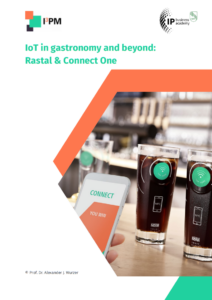IP experts behind the case: Bastian Best & Connect One
The startup Connect One is a pioneer as well as a supplier in the field of digital solutions mainly for the hospitality industry, but also others. E.g. the company develops innovative technologies that enable restaurateurs to run their businesses more efficiently and improve the customer experience. From ordering and payment systems to guest behavior analytics tools, Connect One offers a comprehensive range of solutions that are transforming the way restaurants and bars operate.
Rastal has stood for tradition and quality for generations, with over 100 years of experience in producing high-quality glassware. Rastal has built a reputation for quality and design, serving a wide range of customers in the hospitality and beverage industries worldwide. From beer glasses to spirit glasses, which are designed exclusively for beverage brands as brand exclusive glasses and protected by IP, Rastal offers a wide range of products that meet the highest standards.
Cooperation with the glass maker Rastal
 One example of a Connect One collaboration is the integration of digital ordering systems into Rastal glasses – the Rastal Smartglasses. This innovative solution allows guests to place their orders directly through the glass, which increases efficiency in the restaurant business and improves the customer experience. In addition, the connection with the Connect One analytics tool enables restaurateurs to gain valuable insights into guest behavior and adjust their operations accordingly.
One example of a Connect One collaboration is the integration of digital ordering systems into Rastal glasses – the Rastal Smartglasses. This innovative solution allows guests to place their orders directly through the glass, which increases efficiency in the restaurant business and improves the customer experience. In addition, the connection with the Connect One analytics tool enables restaurateurs to gain valuable insights into guest behavior and adjust their operations accordingly.
The partnership between Rastal and Connect One offers a variety of benefits for customers and the entire food and beverage industry. By integrating digital solutions (NFC-Chips) into Rastal products, the Rastal Smartglasses, establishments can operate more efficiently and increase customer satisfaction. At the same time, the analysis of guest behavior enables restaurateurs to adjust their offers in a targeted manner and create personalized experiences.
The patent behind the case
 To support their business strategy of collaboration, Connect One also decided to start developing a patent portfolio with the Patent EP4152191B1 “Method for providing object-related communication related to physical objects”. You can read more about the company and patent in the case study ConnectOne. The case study was presented by the inventors behind the patent Thomas Nieraad and Carsten Kehrein at the HTB forum IP strategy and management organized by the HTB Initiative and hosted by the EPO.
To support their business strategy of collaboration, Connect One also decided to start developing a patent portfolio with the Patent EP4152191B1 “Method for providing object-related communication related to physical objects”. You can read more about the company and patent in the case study ConnectOne. The case study was presented by the inventors behind the patent Thomas Nieraad and Carsten Kehrein at the HTB forum IP strategy and management organized by the HTB Initiative and hosted by the EPO.
The patent attorney behind the case
 We interviewed the patent attorney behind the case Bastian Best about the role of software patents and their value. Bastian Best started his career with a degree in computer science before he joined the German patent law firm Bardehle Pagenberg. In May 2021 he founded his own patent law firm, BESTPATENT, where he helps companies make sense of patents in the digital transformation. His special interest lies in the patentability issues involved in artificial intelligence, machine learning, blockchain, cryptography and the Internet of Things. He is passionate to inform the broad public about those topics via his Webpage, LinkedIn and YouTube channels. Since November 2021 he is Vice President of the International Institute for IP Management (I3PM). He is also guest lecturer at the Center for Digital Technology and Management (CDTM) and the Leiden Law school.
We interviewed the patent attorney behind the case Bastian Best about the role of software patents and their value. Bastian Best started his career with a degree in computer science before he joined the German patent law firm Bardehle Pagenberg. In May 2021 he founded his own patent law firm, BESTPATENT, where he helps companies make sense of patents in the digital transformation. His special interest lies in the patentability issues involved in artificial intelligence, machine learning, blockchain, cryptography and the Internet of Things. He is passionate to inform the broad public about those topics via his Webpage, LinkedIn and YouTube channels. Since November 2021 he is Vice President of the International Institute for IP Management (I3PM). He is also guest lecturer at the Center for Digital Technology and Management (CDTM) and the Leiden Law school.
IPBA: What are the challenges for companies and startups regarding digital patents?
Bastian Best: My experience it that, especially with digital innovations, companies tend to struggle with how to obtain high-quality patent protection, because
-
- On the one hand, digital inventions are difficult to grasp, you can’t put them on your table and look at them from all sides, and
- On the other hand, there are still many misconceptions, like “software isn’t patentable anyway, so why should we bother?”
This is why I’m so interested in helping companies improve their management of digital IP assets.
IPBA: What should you consider regarding the value of digital patents?
BB: Today in the ubiquitous digital transformation, it is very important to understand how a patent has to look like to have value, because you can make – or your outside counsel can make – seemingly small mistakes, which can have a dramatic impact on the value of the resulting digital patent.
IPBA: Besides the misconception you already mentioned, what is another common misconception startup founders have about patents?
BB: That the granted patent is the only goal. Startups typically do not want to, and also lack the funds, to sue their competitors based on a patent. For startups, especially in the early stage, a pending patent APPLICATION already has tremendous value because it shows to investors that the IP is professionally managed – as a business asset, not only as a legal right.
IPBA: Coming back to digital innovations specifically, can you give one final piece of advice to startup founders to improve the quality of their digital patent filings?
BB: Startups are well advised to pick a patent attorney who has three levels of expertise:
- a deep experience in the world’s patent systems when it comes to the patentability of digital inventions,
- technical experience in the digital world, ideally down to programming skills, and
- an understanding of the digital business models pursued by startups. This ensures that the resulting digital patents properly capture the startup’s value proposition.



